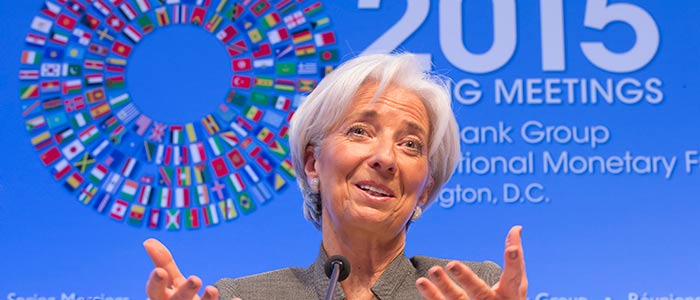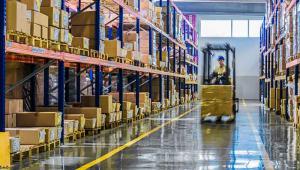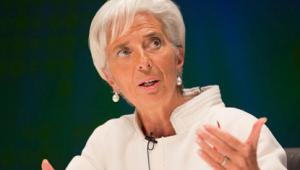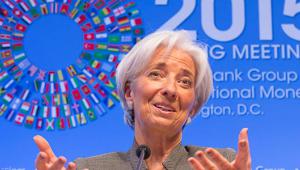WEb_IMF_ChristineLagarde_17169021875_5ac675797e_o.jpg

Christine Lagarde. Credit: IMF Staff Photo/Stephen Jaffe
In the IMF’s third defence of globalisation this week and a clear but implicit nod to the threat of a more inward-looking stance from US president Donald Trump, Lagarde stressed that resilient growth “requires more international cooperation – not less”.
Speaking today, ahead of the IMF-World Bank spring meetings in Washington next week, she said resolving big economic imbalances between countries should be achieved through cooperation.
“[This] means working together to ensure countries observe a level playing field, including by avoiding protectionist measures, as well as distortive policies that give rise to competitive advantage,” she explained.
“Restricting trade would be a ‘self-inflicted wound’ that disrupts supply chains, hurts global output, and inflates the prices of production materials and consumer goods.”
Low-income households, which consume the largest part of their incomes, would be the most affected, she added.
While she agreed that trade had a “negative side”, she echoed the conclusions of an IMF report published yesterday: the decline in wages for low- and middle-income workers, and the connected rise in inequality, was more a result of technological change than trade.
Countries should look for ways to support workers through retraining and life-long learning, job search assistance and measures to help those that have lost their jobs to technology into new sectors.
“The United States, for example, could focus on well-designed assistance for job search and job matching, including through online tools,” she noted, adding that technological solutions, including personalised job adverts delivered via text, can also be employed in emerging markets.
Trump has maintained that he is not an isolationist, but at the same time espouses far more combative rhetoric on trade arrangements he perceives as unfair or harmful for the domestic US economy.
He has already pulled America out of a potential trade deal with Asia-Pacific nations, moved to renegotiate its deal with Canada and Mexico and threatened punitive tariffs on countries like China.
The global economy finally has a “spring in its step” after years of disappointing growth, Lagarde continued, but the fact this is accompanied by doubts about the economic “architecture” that has underpinned growth for decades is cause for concern.
“The sword of protectionism hanging over global trade” was a key risk she identified, along with political uncertainty, in particular in Europe, and tighter access to financing globally, that could prompt an outpouring of assets from poorer economies.
She also highlighted the need to boost productivity, which began its downward trend before the financial crisis of 2008-09.
“Over the long term, this is the most important source of higher income and rising living standards,” she noted.
Policymakers should invest more in education and infrastructure, and providing tax incentives for research and development, the IMF chief said, highlighting analysis that suggests a 40% increase in the latter could boost advanced economies’ GDP by 5% in the long term.
Trade also promotes innovation-sharing, she continued, and encourages firms to invest in new technologies and efficient business practices.
“Today, billions of people enjoy longer, healthier and more prosperous lives, largely because of our ability to harness the power of trade and productivity.”













